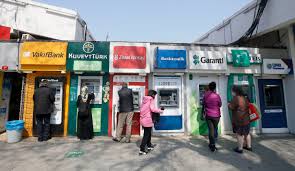Turkey is in the midst of a mind-blowing credit boom, with loan growth having reached 21% YTD and proceeding at an annualized rate of 71.5%. Erdogan administration has given sate banks carte blanche to loan at will and at a loss to companies and consumers to tide the economy over the Covid-19 induced stagnation. Private banks are pressured via jawboning and daily changes in Central Bank and BRSA regulations to force faster loan growth too,. Great economists like Carmen Reinhart and Kenneth Rogoff has taught us the lesson that prolonged credit expansion in excess of nominal GDP always ends up in tears. This new report by S&P credit rating agency suggest that the Rubicon has been crossed.
S&P: Problem loans in Turkish banking sector to exceed 20% by 2021
S&P Global Ratings said on Tuesday it estimated problematic loans at Turkish banks would rise to more than 20% by next year, citing pressures from the country’s economic recession and the slide of the lira, reported Reuters.
Despite a relatively low level of reported non-performing loans (NPLs) of 4.6% at the end of May, the ratings agency cited a number of pressure points faced by Turkey’s banks, including high corporate sector indebtedness compared to other emerging markets.
“Risks are further exacerbated by some specific characteristics … namely, the accelerated lending through the Credit Guarantee Fund (CGF), and more recently via state banks, as well as the high proportion of foreign currency lending,” S&P added, saying foreign currency lending stood at almost 37% of gross loans.
“We expect NPLs to reach 11%-12% by 2021, while problematic loans (NPLs plus restructured loans) will pass to more than 20% of loans from about 10% in September 2019,” S&P said in a note.
Earlier on Tuesday, Turkish Finance Minister Berat Albayrak called on banks to speed up restructuring of loans and said the government would support the formation of an asset management company to take on loans of problematic companies from all banks.
S&P added it considered checks and balances within the Turkish institutional system weak, which raised questions about the quality of regulation and perceived independence of the watchdog and the central bank.
You can follow our English language YouTube videos @ REAL TURKEY: https://www.youtube.com/channel/UCKpFJB4GFiNkhmpVZQ_d9Rg
And content at Twitter: @AtillaEng
Facebook: Real Turkey Channel: https://www.facebook.com/realturkeychannel/
